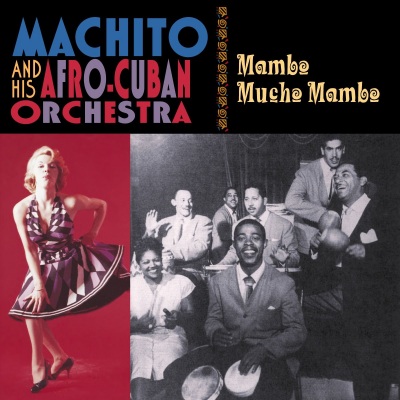
Mambo Mucho Mambo
The great Machito was born as Frank Grillo into a family of six in Havana, Cuba. At a very early age he became very attracted to music, and as a young boy he liked to sing with his father’s employees. (His father was a manufacturer of cigars, who also owned a warehouse and general store.) Through his singing the young Machito got to be around some of the most famous groups of that time, the 1920s, such as the Sexteto Habanero, for instance. Later he began playing the maraccas, the instrument that would be with him all through his life, having carefully observed one of the best maraqueros in all Cuba, Champito. From 1928 to 1937 he worked with several different groups, such as El Sexteto Occidente, Sexteto Agabama, Sexteto Universo, Sexteto Nacional etcetera. In 1937 he arrived in New York and quickly found work with a group that called itself La Estrella Habanera. Some time later he was a featured singer with Septeto Anacaona, in which Machito’s sister Graciela also sang; then for the next two years Machito recorded with Cuarteto Caney, Conjunto Moderno and the Orquesta Hatuey, as well as appearing as singer with the bands of Noro Morales, Augusto Cohen and Xavier Cugat. In 1940 he decided to form his own band, The Afro-Cubans, with Mario Bauza as musical director. Bauza, a brilliant trumpet player, was an old friend from Havana who had arrived in New York in 1930, and had already distinguished himself in the bands of Don Redman, Noble Sissle and Cab Calloway, apart from his many appearances at studio sessions. Machito’s orchestra actually began with eleven men and made several recordings, but he was particularly proud of the recording that Stan Kenton’s band made with his name (Machito’s) as the title, saying: “That duet at the end (Buddy Childers on trumpet, and Skip Layton trombone) is just too much! Kenton was among the first to recognize the richness of Afro-Cuban rhythms. For that matter, we are very fortunate in this country because we have the folk music of every country in the world to draw from. All the people who came here to live brought their music with them. That’s why our music is so rich.” When the band opened at the La Conga night club, it was an immediate success. The Afro-Cubans were on their way! A year later the first recordings were made of the band under its own name, as well as backing the celebrated singer Miguelito Valdés on his. In 1943 Machito was drafted into the U.S. army, and by the time his discharge came the Afro-Cubans were already experimenting with jazz. The very first Afro-Cuban tune that was played was Tanga, and it quickly became the band’s theme song. After Word War II a new form of jazz was being played, Bebop, and Machito played alongside such jazz greats as Charlie Parker, Dizzy Gillespie and Ella Fitzgerald, to name just three among many, also making some recordings. The recordings presented here are among the most famous performances ever by the Afro-Cubans and, moreover, they were made at probably the most creative period of Machito’s long career, a time when the orchestra had reached a musical peak that clearly justified its world-wide fame and recognition.
